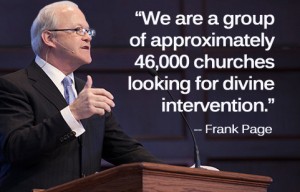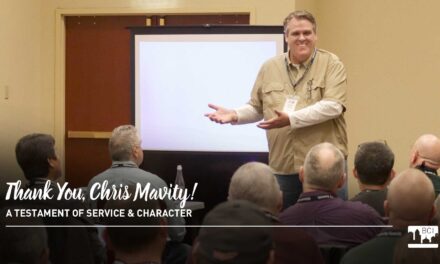
“We are a group of approximately 46,000 churches looking for divine intervention,” SBC Executive Committee president Frank Page told an audience at Midwestern Baptist Theological Seminary, in answer to his own question, “Who are Southern Baptists?”
KANSAS CITY, Mo. (BP) — Calling his message a “frightening responsibility” because of his desire to speak accurately, while simultaneously being “honoring of our Lord,” Frank Page, president of the Southern Baptist Convention Executive Committee, delivered an “State of the SBC” address at Midwestern Baptist Theological Seminary.
Students, faculty, staff and local church pastors from Missouri, Kansas and the Midwest region gathered in the seminary’s chapel to listen to the message, which covered a wide range of issues within the SBC. Page shared his own observations, predictions and exhortations to Southern Baptists.
Jason K. Allen, Midwestern Seminary’s president, said “Midwestern Seminary is absolutely committed to serving the churches of the Southern Baptist Convention, so it is fitting, and even poetic, that Dr. Page delivered such a prominent and historic address on the campus of Midwestern Seminary.
“Dr. Page spoke with insight and foresight, demonstrating once again the unique leadership role he fills for Southern Baptists.”
Page’s address began with an admission of having a fascination with scientific studies of various kinds, including earthquakes. He noted that below the earth’s surface are large tectonic plates. Where these plates meet are called “fault lines.” When tectonic plates move against one another, their convergence results in intense geological activity, such as earthquakes and volcanoes.
“Fault lines happen even in organizations,” Page said in his Jan. 15 address. “And like on the earth, where the fault lines and tectonic plates come together, pressure builds. If that pressure is not alleviated, then deep damage occurs.”
There are fault lines, Page said, in the Southern Baptist Convention where “pressure has built.”
“Sometimes pressure is eased in a godly, biblical and legitimate way, and sometimes things happen that cause lasting damage,” he said.
Looking back, Page identified the Conservative Resurgence as “a time in our history when indeed there was a several-decades long struggle over the issue of how do Baptists believe and hold to the veracity of the Word of God.”
“The arguments that came in those days found their roots decades ago, but the big fault lines and pressure was experienced perhaps most profoundly in the eighties and in the nineties,” he said.
“The institution in which you now study or teach or are now sitting was one of the epicenters in that epic struggle.” Page said, referencing the controversy that took place at Midwestern Seminary in 1961. Ralph Elliott, chair of the seminary’s Old Testament department, argued in his book “The Message of Genesis” that it was not literal history. Instead, he contended, it was a book of symbolic stories.
“There were many battles fought, much pressure released, and yes, some damage done,” Page added.
Page also pointed to pressure related to the more recent debate about Calvinism versus non-Calvinism.
“I do believe that this last year at the convention we saw God show up in a way that relieved some of that pressure, as leaders from both sides of the fence gathered to say, ‘We want to work together for the Gospel,” he said. “Too much is at stake not to do so. I applaud those leaders from both sides of the soteriological fence.
“Do I think that fault line is fixed forever? Hardly. But I said to them in all honesty, ‘I want us to work together so that we can at least win some people to Christ for now. Can we do that?'”
Page briefly mentioned a current “ecclesiological” fault line affecting the convention. Page said he believes there are developing fault lines with mounting pressures as Baptists struggle with how to govern a church, particularly as it relates to congregational governance, elder leadership and the role of deacons.
The most predominant fault line in the convention, Page added, was neither theological nor ecclesiological. Instead, the greatest amount of pressure building is due to “methodological” tensions.
Some may describe it as “individual versus corporate,” “societal versus cooperative,” “contemporary versus traditional,” or “the young versus the old,” he said.
“This methodological divide is impacting the direction of our convention,” Page said. “I wake up every day asking myself the question: ‘Who are we? Who is the Southern Baptist Convention?’ There is no discernible answer.”
Page admitted he often thinks a solution to the question is at hand, but it’s quickly proven inadequate.
The methodological quandary has affected some of the denomination’s entities. He noted one organization asked what life may look like after the Cooperative Program.
“I’d love to know what was said in there,” Page remarked.
He also attributed the record-low baptismal rates to the methodological divide within the convention.
“We have argued over issues that have taken away our evangelistic fervor to the point that now our baptismal rates have reached a low not seen since 1948. God help us,” Page said.
“We can lament and we can say we’re a declining denomination,” Page continued, “and by many statistical analyses, we are. Some would say we’re a denomination in the midst of clarification, finally beginning to see things as they really are. We struggle also with the fact that one out of every five Southern Baptist churches do not send in any kind of report, so we have to extrapolate and to guess what is really happening out there when we are not always given accurate statistical material with which to work.”
Regardless of what kind of statistical material is available, Page described in one sentence the state of the convention.
“The status of our convention is best described thus … we are a group of approximately 46,000 churches looking for divine intervention.”
Referencing Daniel 2:28, where the prophet Daniel told Nebuchadnezzar that Daniel was incapable of interpreting the king’s dream of himself. Daniel declared, “But there is a God!” Page said the reality of divine intervention stands before the convention, not as a mere possibility, nor as a last ditch effort, but as our true hope.
“We are a convention made up of messengers who meet every year, declining in number … and you say, ‘What is our future?’ I do not know. I’m asked that every week by someone, and I say, ‘I cannot answer.’ If things do not change, I can tell you in 20 years we will be happy to have 27,000, not 47,000 churches. If things do not change, our baptismal rates will continue to suffer. But there is a God!”
Despite some discouraging trends, Page said he still has hope for the future of the convention, especially when he sees 16,000 students enrolled in the six Southern Baptist seminaries, the North American Mission Board’s goal of 15,000 new churches by 2020, and the increased assistance for churches needing revitalization.
“When we realize that our answers are not in logistical moving around of chairs on the deck of the Titanic but seeking absolute new Holy Spirit-given power, then we will say the future of this convention is bright indeed.”
Tim Sweetman is director of communications at Midwestern Baptist Theological Seminary. Watch Page’s address here. Watch a discussion with Frank Page on the state of the SBC here.






